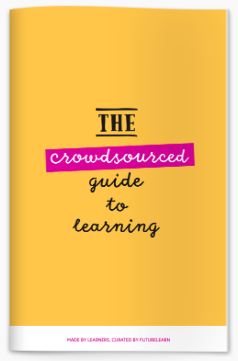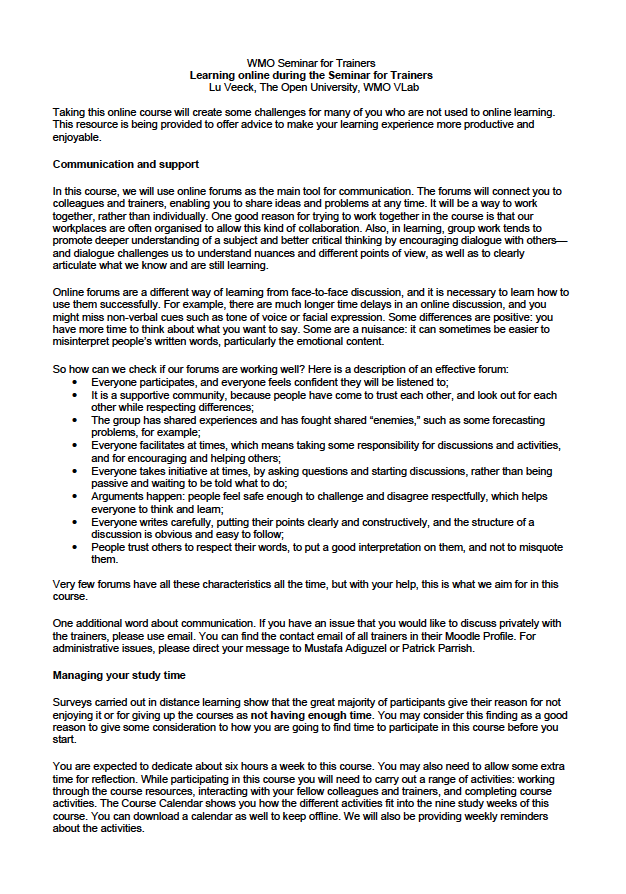1.3.3 Provide online learning guidance
| 站点: | WMO Education and Training Programme |
| 课程: | Calmet Moodle Unit 1 - Design an effective learning environment |
| 图书: | 1.3.3 Provide online learning guidance |
| 打印: | 访客用户 |
| 日期: | 2026年02月8日 星期日 09:33 |
描述
.
1. Online Learning Guidance
Studying can be a lot more enjoyable when learners take time to think about ways they learn effectively. Providing learning guidance helps learners in this exact task – taking time to think about the learning journey they are about to start.
Educators and course providers have a duty of care to make sure that learners can make the most out of their learning experiences. This is no different when the learning experience takes place online. Even though learners’ experiences in the use of digital environments are increasing fast, these do not translate into being experienced learners in a digital environment. Yes, knowing how to use the technology involved in the course is important to successfully complete a course online, but what else could help?
The following are suggestions of topics to consider when writing guidance for online learning. As always, there is no “one solution fits all”. The best approach would be to consider the level of experience your learners have as attendees of online training, and the kind of skills they will need in order to perform well in the course you have designed.
1.1. Time management skills
Some guidance on time management skills is always helpful. Student surveys carried out by universities usually point to the lack of time management skills as one of the most common causes for learners failing, giving up or simply not enjoying their online courses. Effective time management is particularly important in online courses because usually the majority of time spent on the course is planned and controlled by the learner. Reminding learners about the amount of time they are expected to dedicate to the course is good, but remind them to consider their own life commitments to draw a realistic study plan.
1.2. Core study skills
Although we all differ in the way we learn, there are key approaches and techniques that tend to be effective for many of us. Suggesting some approaches to core study skills can be of great help to learners. For example, if the course involves considerable amounts of reading, suggesting active reading techniques and creative ways for note taking can be of great help. Consulting with recent alumni to check on their experiences and tips for successful online learning is a very good way of suggesting tried and tested techniques. Remember to ask permission to share their advice in future guides.
1.3. Good academic practices
An open chat about good academic practices is as important in online courses as it is in classroom courses. The reason this is mentioned here is that with the increased availability of online resources, learners lacking confidence or experience may end up copying considerable amounts of material without giving the appropriate credits for it. Including some information about good academic practices and ways to further develop them goes a long way helping learners to feel more responsible for their acts and avoiding plagiarism.
1.4. The importance of peer support
Remind learners that trainers are not the only source of support. Highlight the relevance of peer support and how much learning experiences are enriched by writing and receiving comments in course blogs, forums and activities. When learners try to explain something to someone else it is a very good way to check their own understanding and build communication skills.
1.5. Approaching collaboration
When using collaborative activities in a course, make sure you explain how fluid or rigid the framework of the collaboration should be. This explanation can be provided in the form of a friendly conversation within the online learning guidance. This is the time learners will be thinking of how to approach the course, so it helps to keep the information here to allow just enough time for learners to think how they want to experiment and discover what works best for them.
1.6. Feedback and reflection
Indicate the benefits of learning from feedback and reflection – if the course strategy involves feedback on learners’ assignments, it is worth saying a few words about ways of benefiting from it. Suggesting simple actions and behaviours can help, like trying to identify the strengths and weaknesses highlighted in the feedback and being open to try something new that was suggested by the instructor, for example. It is also good to remind learners that instructors always aim the feedback to be positive and aid learning. Make a clear point that trainers are happy to provide clarifications about the feedback and engage in a dialogue for further advice.
1.7. Motivation
Provide some words of motivation and suggestions of ways to stay motivated during the course, like keeping in touch with trainers and peers. There is nothing worse for learners than watching a silent forum and assuming this means everyone is busy preparing the assignment, when you yourself feel totally stuck in that particular part of the course. Encourage communication that strengthens collaboration and peer support.
2. Examples
Some examples of Online Learning Guides used by course providers are presented to you in the following pages.
2.1. Example 1
The “Crowdsourced guide to learning” is a very interesting document that was created using advice  given by participants of online courses themselves. This document was created by Future Learn, a company that offers a diverse selection of courses from leading universities and cultural institutions from around the world. As mentioned by FutureLearn, when putting this document together they learned that “while there are tried and tested methods for learning effectively, everyone has their own idiosyncrasies and habits that help them achieve their goals”.
given by participants of online courses themselves. This document was created by Future Learn, a company that offers a diverse selection of courses from leading universities and cultural institutions from around the world. As mentioned by FutureLearn, when putting this document together they learned that “while there are tried and tested methods for learning effectively, everyone has their own idiosyncrasies and habits that help them achieve their goals”.
Available online at https://www.futurelearn.com/learning-guide
2.2. Example 2
This is an example of online learning guidance created with a particular course in mind. While the advice given can be used to support online learning in general, the selection of advice included in the document was made to fit relevant activities of the course and was tailored to address an specific audience. The intention was to give advice that felt almost “personal” to the participants. This document was used in the WMO Seminar for Trainers 2014.
Please click the cover of the guide below to download the file.
